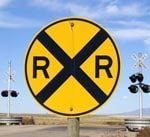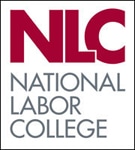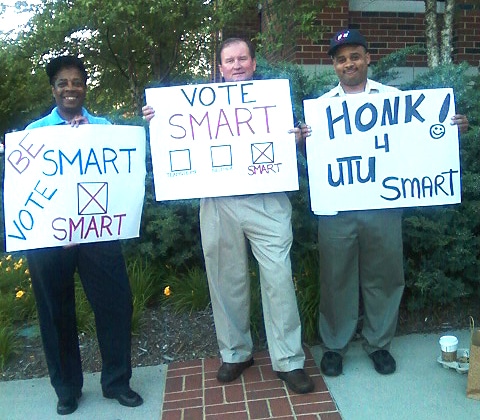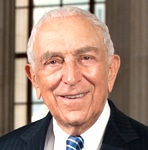 Local 1188 at Oklahoma City, Okla., has established a relief fund to assist their brothers and sisters who have been affected by May’s tornado in Moore, Okla.
Local 1188 at Oklahoma City, Okla., has established a relief fund to assist their brothers and sisters who have been affected by May’s tornado in Moore, Okla.
“Several members of Local 1188 and Local 1042 in Oklahoma City have had their homes damaged or completely destroyed. There were also other brothers and sisters of other unions that had damage. We would like to assist our railroad family as much as possible and get their lives back together. All proceeds will go directly to members,” said Secretary & Treasurer Steve Freeman.
Donations may be made to “UTU Local 1188 Tornado Relief” at Arvest Banks or sent to Arvest Bank, 9350 S. Western Ave., Oklahoma City, OK 73139.
An typographical error in June issue of the SMART Transportation Division News omits a portion of the bank’s address above. We apologize for the omission.
Year: 2013

Increasing the contributions of the SMART Transportation Division’s input in shaping public transportation policy, SMART Transportation Division General Secretary & Treasurer John Previsich May 30 was named to the U.S. Department of Transportation’s National Freight Advisory Committee by DOT Secretary Ray LaHood.
The committee is a diverse group of professionals that will provide advice and recommendations aimed at improving the national freight transportation system.
LaHood said a strong freight transportation system is critical to the nation’s economy and is essential for helping meet President Obama’s goal of doubling U.S. exports by 2015.
“The strength of our economy and the strength of our national freight system go hand in hand,” LaHood said. “The members of this committee understand firsthand the critical importance of freight movement, and their valuable insight will help ensure that our system is more secure and better connected.”
Previsich was nominated for the panel by SMART Transportation Division President Mike Futhey.
“This appointment will permit the concerns of our members in the rail, airline and bus transportation industries to be placed squarely on the table for consideration and inclusion in the talks leading to the establishment of a ‘national freight plan’ for the 21st century,” Previsich said.
“The inclusion of labor representatives at the highest level of such discussions is an opportunity for input into the decision making process that will benefit our members, and all of labor, for years to come.
“The Obama administration deserves credit for ensuring that the interests of working people are a part of the nation’s long term transportation planning.”
Members of the committee provide various perspectives on freight transportation and represent various modes of transportation, geographic regions, and policy areas. Freight customers and providers, labor representatives, safety experts and government entities are all represented.
By engaging members representing diverse interests, the committee will provide recommendations to the secretary of transportation on how DOT can improve its freight transportation policies and programs.
The DOT solicited nominations in February and LaHood selected members with input from the MAP-21 Freight Implementation Team, as well as the Freight Policy Council, an internal body of DOT leadership created to facilitate cross-modal implementation of freight provisions in the recently signed surface transportation bill, Moving Ahead for Progress in the 21st Century, or MAP-21. MAP-21 established a national freight policy and called for the creation of a National Freight Strategic Plan.
Over the last four years, the Obama Administration has made considerable investments in our national freight network. Through four rounds of the TIGER Grant program, DOT has directed $1 billion toward projects that primarily address freight. This includes more than $650 million to projects that strengthen freight rail infrastructure, reduce freight bottlenecks and alleviate congestion issues.
Members will serve two-year terms and meet at least three times per year. The first NFAC meeting is scheduled for June 25, 2013, at the Department of Transportation and will include an overview of MAP-21 freight provisions and preliminary identification of NFAC activities.

Safety Advisory 2013-04 also notes that “under certain circumstances, particularly where human error is involved, the fail-safe features [of warning systems] can be deactivated or circumvented, creating the potential for an accident. FRA has found that serious highway-rail grade crossing accidents and false proceed signal failures have occurred due to human error.”
According to the FRA, the most effective practices to prevent this include requiring railroad employees to obtain proper authority from the train dispatcher or other appropriate personnel responsible for the movement of trains through the territory before disabling a warning or signaling system, and a requirement that all disabled systems be properly inspected and tested to ensure they operate as designed before being restored to service.
The list of recommended actions include:
1. Each railroad responsible for the proper operation of a highway-rail grade crossing warning system or wayside signal system review and evaluate its specific railroadwide instructions for the proper method for temporary removal of these systems from service. These instructions should address the following items:
- a. The manner in which the deactivation is authorized.
- b. The personnel designated to authorize deactivation.
- c. The protocols for notifying appropriate persons, especially personnel responsible for the movement of trains, that a grade crossing warning system or wayside signal system has been temporarily removed from service.
- d. The appropriate methods of providing for the safety of train movements while the grade crossing warning system or wayside signal system is temporarily removed from service.
- e. The requirements necessary to perform an inspection and operational test of the pertinent system components before restoring the grade crossing warning system or wayside signal system to service.
- f. The protocols for documenting and notifying appropriate persons that the grade crossing warning system or wayside signal system has been properly tested and restored to service.
2. Each railroad provide regular periodic training to all affected employees to ensure their understanding of instructions for the proper procedures for the temporary removal from service of grade crossing warning or wayside signal systems, including the proper use of jumper wires.
Highway-rail grade crossing warning devices and wayside train signals are among the most important safety systems in the railroad industry for preventing train collisions and highway-rail grade crossing accidents. Despite the high degree of reliability of these systems, failures occasionally do occur.
FRA previously made related recommendations to railroads regarding the importance of clear safety procedures to ensure the safety of highway-rail grade crossing warning systems and wayside signal systems in Safety Advisory 2002–01.
To read the complete advisory and background, which was published June 3 in the Federal Register, click here.

The proposal would have loosened some of the restrictions created after the Sept. 11 terrorist attacks. John S. Pistole, the agency’s administrator, argued that the plan would allow airport security agents to focus on “higher threat” items. Looking for small pocketknives that pose little threat to an airliner, he said, was time-consuming and potentially distracting to agents looking for explosives that can bring down a plane, for instance.
Read the full story at The New York Times.
The Federal Railroad Administration June 3 issued a safety advisory on the importance railroad safety procedures to ensure the safety of the traveling public and railroad employees when highway-rail grade crossing warning systems and wayside signal systems are temporarily removed from service for purposes of testing, inspection, maintenance, or repair. Read more.

Local 1715 represents bus operators employed by the Charlotte Area Transit System (CATS).
On May 31, the National Labor Relations Board released the official tally of a representation vote held earlier that day in which SMART was chosen by nearly a 3-1 margin.
SMART TD Director of Organizing Rich Ross gave the official vote count as 267-97 in favor of SMART. There are approximately 600 drivers employed in the system.
The SMART TD is the collective bargaining agent for both CATS’ bus operators and bus mechanics (Local 1596), but the mechanics were not targeted during the raid.
Ross said rallying the SMART membership here was truly a team effort and he thanked International Organizers Mike Lewis and Calvin Studivant and General Chairperson Alvy Hughes for their outstanding effort. He also ackowledged the efforts of North Carolina State Legislative Director Ron Ingerick, Vice General Chairpersons Hasson Trent and Cheryl Brown, General Committee Secretary Bill Brown and local officers Bruce Wright, Kevin Moss, Brenda Moore, Debra Franklin and Donell Taylor.
“I believe it is now our responsibility to show the people that voted against UTU-SMART why they should have voted for us,” Ross said.
The transit system’s website says that CATS is the largest transit system between Atlanta, Ga., and Washington, D.C., with more than 70 local, express and regional bus routes, a light rail line and services for the disabled.
Local 1715 Legislative Rep. Debra Franklin, International Organizer Mike Lewis and
Local 1715 Chairperson Kevin Moss rally Charlotte Area Transit System bus operators
during a representation vote May 31.
SMART Transportation Division-represented hostlers employed by the Canadian National Railway have ratified a new five-year agreement by a unanimous majority.
The agreement provides for wage increases, back pay and health and welfare benefits that mirror the 2011 UTU National Agreement.
UTU International Vice-President Dave Wier, who assisted with the negotiations, congratulates GO 436 General Chairperson Jim Herndon for “the exceptional effort put forth during the long and difficult negotiations which resulted in an agreement with improvements in wages and benefits.”

The goal of the rail program is to build a nationwide pool of skilled peer trainers to deliver awareness level hazardous material training.
The DOT-funded train-the-trainer courses provide regional peer trainers with the skills and knowledge necessary to deliver this training at their job-sites, union meetings and in their communities. There are no pre-requisites required to participate in the six-day train-the-trainer course.
Two DOT Train-the-Trainer courses will be held July 14-20, 2013, and Sept. 22-28, 2013, at 15101 Sweitzer Lane, Laurel MD, 20707.
Interested rail workers can register online at www.hazmatgmc.org by selecting the course desription tab, followed by the “Register Now” link for the Hazardous Materials Instructors Training.
For more information, call Freddie Thomas in the Hazmat office at (301) 431-5457, or email fthomas@nlc.edu.
Long an advocate for the region’s train system, Sen. Frank Lautenberg will ride the rails one last time on the way to his final resting place in Arlington National Cemetery.
Funeral ceremonies for Lautenberg will be held at 11:30 a.m. Wednesday at the Park Avenue Synagogue in Manhattan, according to Riverside Memorial Chapel.
Read the complete article at The Star-Ledger.
The following comments were offered by SMART Transportation Division New Jersey State Legislative Director Dan O’Connell:
“It’s fitting that he will travel by rail – as he did many times to Washington, D.C. – one last time.
“I first met Sen. Lautenberg after I became state legislative director in 1996. We discussed Amtrak, mass transit (New Jersey Transit), labor issues and more. He couldn’t have been nicer. I let him know that I had, as a Conrail employee, worked Amtrak trains between New York City and Washington, D.C.. As our meeting was coming to a close, he asked about working in the engines of those trains. I watched him transform from the U.S. senator from New Jersey to another man mesmerized by trains. He turned to his aides with him and said ‘you really have to experience this, being on the head-end of a train at 110 mph.’ Our members, especially those in passenger service, owe him a great debt for his fights to secure funding for the survival of Amtrak, to allow commuter rail to grow and for being a reliable supporter of the working men and women of this country.
“Thanks to him, our members at Amtrak and New Jersey Transit have better infrastructure, locomotives, rail cars, and improved stations. Because of that, they have a more secure employment.
“He was one of the cosponsors of the Railroad Retirement Reform legislation that has made our pension system more secure for our active and retired members. He had been one of the prime movers behind the ARC tunnel before the project was cancelled. He was working to insure that Amtrak’s Gateway Project would go forward, adding another rail tunnel under the Hudson River along with a new Amtrak station in New York City. That will allow more trains into and out of New York City and that will mean more jobs.
“I mention these things for two reasons. One, because in most of the articles that have been written about him and his accomplishments, these either get a quick mention or no mention at all. Second, many Americans are disgusted by our politics these days and after reading the news, one can understand why. But, when you see what one man – Sen. Lautenberg – accomplished after serving in World War II and using the GI Bill after the war to found a company that employs more than 55,000 people, he should be respected.
“In some 30 years as our senator, he never forgot his roots as a poor kid from Paterson whose father died when he was young. He cared about working people and people that needed a hand up. He made our country a better place and that should be what politicians aspire to today.”


